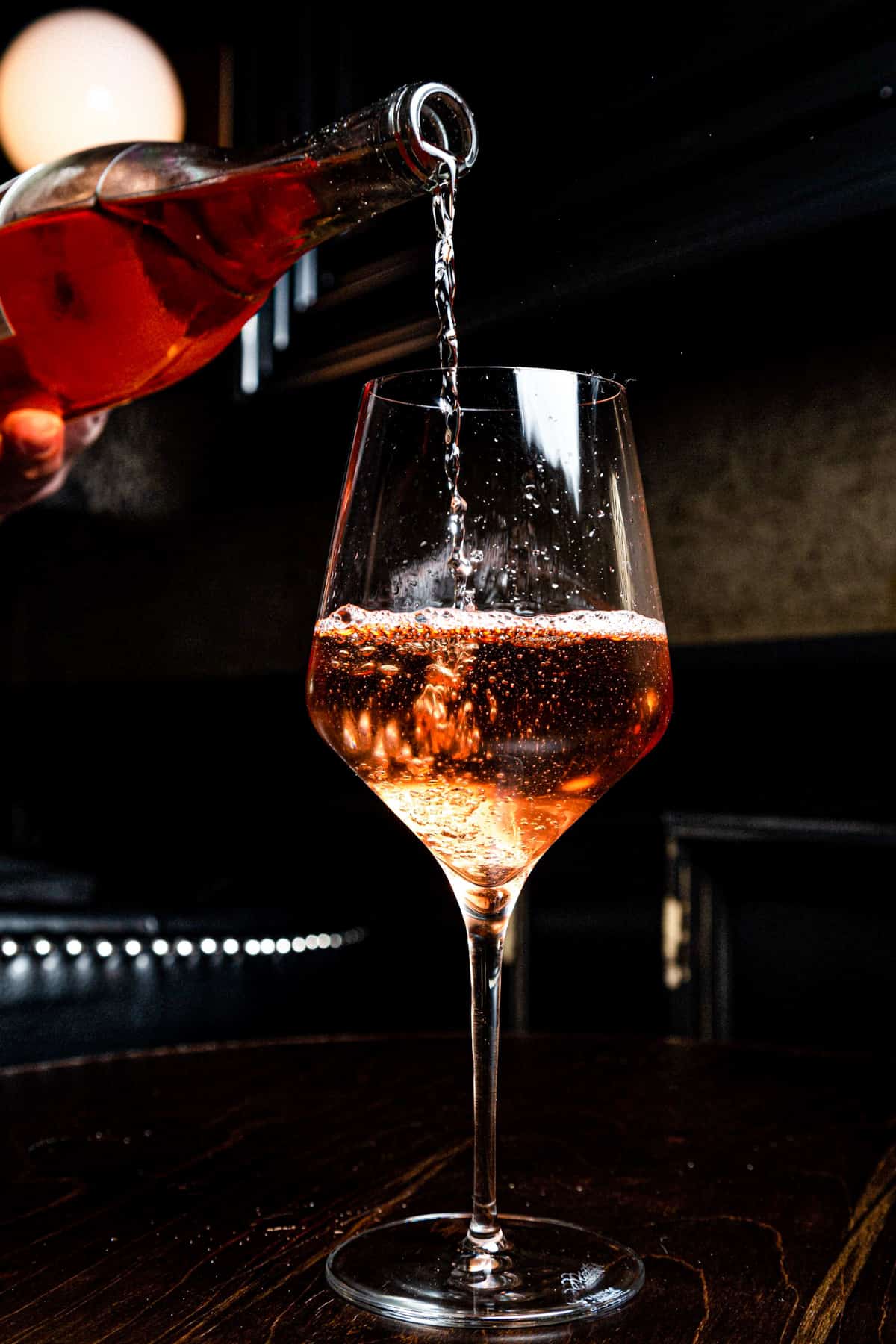If you're embarking on a keto diet, you might wonder, "Can you drink wine on keto?" We're here to guide you through the wonderful world of low-carb alcoholic beverages so you can raise glasses of wine in celebration without derailing your dietary lifestyle!

Jump to:
- What is a keto diet?
- Ketosis and alcohol
- Can you drink wine on keto?
- How to choose keto-friendly wines?
- 🍷 Which wine has the least amount of carbs?
- What are some keto-friendly drink mixers?
- Wines to avoid on a keto diet
- What is residual sugar?
- How much alcohol is recommended on a keto diet?
- Wrap-up and conclusion
- Frequently asked questions
What is a keto diet?
The keto diet is about embracing a low-carb, high-fat diet with moderate protein intake. The goal is to trigger a state called ketosis, where your body burns fat for energy instead of relying on carbohydrates. To achieve ketosis, most keto dieters aim for around 5-10% of their daily calories to come from carbs.
Ketosis and alcohol
Now, let's talk about the dynamic duo of ketosis and alcohol. Does alcohol ruin your keto? Not entirely, but it can slow down your progress. When you enjoy a glass of wine or any alcoholic drink, your liver shifts gears to process the alcohol first, pausing its fat-burning duties temporarily. The result? Your body puts fat burning on hold until the alcohol is dealt with. But fear not; a glass of wine won't completely kick you out of ketosis; just delay it a bit.
Can you drink wine on keto?
The short answer is an enthusiastic YES! You can absolutely indulge in wine while on a keto diet. However, not all wines (or other alcoholic beverages) are created equal in the eyes of the keto gods. Some can have a shockingly high carbohydrate content that's unsuitable for keto dieters.
Beer and a few types of wine are off-limits on the keto diet since they are heavy in carbs. If you want to consume alcohol but follow the ketogenic diet, choose drinks with fewer carbohydrates and avoid sugary cocktails.
The good news is that plenty of low-carb wine options won't sabotage your keto diet goals, so let's find out how you can choose them!

How to choose keto-friendly wines?
Choosing keto-friendly wines is essential for staying true to your low-carb lifestyle. Here are some keto wine tips to consider:
- Low carbohydrate content: Opt for wines with less than 5 grams of carbohydrates per serving to stay within your daily carb limit.
- Minimal residual sugar: Residual sugar refers to the natural sugars left in the wine after fermentation. Sweet wines tend to contain more residual sugar, which can interfere with your ketosis state. Aim for options with minimal to no residual sugar to keep carb counts low.
- Alcohol content: The alcohol levels of wine can also impact its carb content. Wines with higher alcohol by volume (ABV) typically have fewer carbs. Look for a bottle of wine with an ABV of at least 13.5% to get the most bang for your carb buck.
🍷 Which wine has the least amount of carbs?
Choosing the right wines can be a game-changer when following a keto diet. Opting for dry wines with minimal residual sugar and lower alcohol content (less than 13.5% ABV) is key, as keto may lower your alcohol tolerance. To make your wine selection easier, we've broken down some popular types of wine, whether you prefer red, white, or rosé.
Red wines
If you love red wine and are on a keto diet, opt for a light-bodied and dry variety. Bold, high-alcohol red wines often contain more residual sugar and carbs.
Here's a carb breakdown (grab per serving) for each type of red wine:
White wines with lower carbs
Choose dry white wines for a low-carb option that aligns with your carb-counting goals. Here's the carb count (g per serving) for each white wine:
Rosé wines
Opt for a dry rosé made from grapes like Grenache, Sangiovese, Pinot noir, or Syrah to keep it keto-friendly at around 2.9 carbs per serving.
Be cautious with sweet and sparkling rosé varieties, as they won't align with your low-carb goals. Pink Moscato, for example, starts at around 8 grams of carbs per serving, while some sparkling rosé wines exceed 15 grams of carbs.
Note: Remember, when it comes to wine, "brut" means "dry," indicating lower residual sugars and a lower carb count. Sparkling wines fall in the middle of the list, with most brut champagnes containing approximately 4 grams of carbs per serving.
Zero-carb alcohol options
Pure Liquor options like whiskey, gin, tequila, rum, bourbon, moonshine, and vodka are all a good choice as the sugar content is nonexistent.
What are some keto-friendly drink mixers?
If you're practicing a keto diet, you have a wide variety of low-carb alcoholic beverages. Pure whiskey, gin, tequila, rum, and vodka are excellent options, as they contain zero carbohydrates. Savor them independently or get creative by mixing them with keto-friendly mixers to enhance the taste.
Replace those high-carb common mixers with these keto-friendly options:
Low-carb mixers like these are a great way to improve the flavor of your drink without adding too many calories or carbs.
Wines to avoid on a keto diet
If you're following a keto diet, being mindful of the wines you indulge in is essential. Some wines can be high in carbohydrates and sugar, making them unsuitable for a low-carb lifestyle. Here are the alcoholic drinks that are best left off your keto menu:
Here are some wine varieties that are best avoided on a keto diet due to their higher carb content:
Besides wines, wine coolers and ciders are also not keto-friendly due to their high sugar content.
What is residual sugar?
Carbohydrates in wine primarily come from the natural sugars in grapes. During fermentation, yeast converts these sugars into alcohol, leaving some residual sugar, determining the wine's carb content.
Some winemakers may add sugar during the winemaking process to enhance the wine's flavor or balance its acidity. This can also contribute to the overall carb content of the wine.
Opting for dry wines with lower residual sugar is a better choice for those looking to minimize their carb intake while still enjoying a glass of wine.
How much alcohol is recommended on a keto diet?
While many short-term ketogenic diets advise against consuming alcohol, moderation is key! Here's a general guideline for alcohol consumption on a keto diet:
Interestingly, women have fewer enzymes in their bodies capable of processing alcohol than men, so they may not tolerate as much alcohol. It's important to recognize this biological difference and be mindful of your alcohol intake.
Wrap-up and conclusion
So there you have it, wine lovers! You can absolutely indulge in a glass of wine while staying true to your low-carb journey. Embrace the joy of sipping your favorite keto wine without worrying about derailing your low-carb efforts.
Cheers to enjoying life to the fullest, one sip and one delicious bite at a time! Keep exploring, savoring, and shining on your keto journey while promoting healthy lifestyles through mindful wine choices!

Leave a Reply